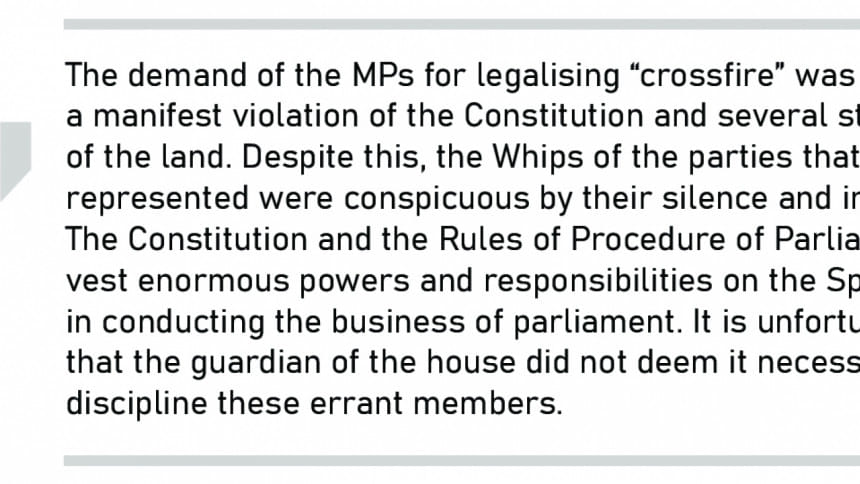Parliamentarians’ assault on the rule of law

In the annals of Bangladesh's parliamentary history, January 14, 2020 has secured special significance. It was the day when as many as five parliamentarians from the treasury and opposition benches in unison called upon the government to allow law enforcement agencies to summarily kill rapists in "crossfire" to stop rape incidents, which have registered a sharp rise in recent times. The agitated MPs urged the Speaker to set a date to discuss the reasons for increase in rape cases and how to end the scourge.
Reacting on the Police Headquarters' report on a sharp rise in the incidents of rape in 2019, a Jatiya Party (JP) lawmaker called for amendments to the present law. He said mere life term will never be able to control the growing number of rape incidents. "A provision for death penalty should be incorporated into the law." Pointing to the Home Minister, he asked, "You are allowing 'crossfire' as part of a fight against drugs. Then why aren't you doing the same in case of rape?" As a solution to the persistent problem of not finding witnesses in the trial of rape cases, a third term JP parliamentarian, trained in law, advised, "you will have to go for "encounters" to free society from this menace." Taunting rights activists who advocate against extrajudicial killings, he said "You would understand the pain only if you or your mother or sister become a victim." He asserted that recent incidents of rape would not have occurred had the rapists been killed in "crossfire". In his wisdom, this senior JP MP conveyed the idea to the house that killing 10 to 12 rapists in "crossfire" would have surely brought down rape incidents. To remove any doubt of the believers about the righteousness of extrajudicial killings, a cap and beard donning Tarikat Federation MP opined, "I can say that you will go to heaven if you kill rapists in 'crossfire'."
The demand of opposition lawmakers for the killing of rapists through "encounters" secured unqualified support of an influential member of the ruling party. The former powerful minister observed, "It's true we need a tougher law. But if we can take instant actions through "crossfire" on drug-related issues, then why can't we follow the same in case of rapists?" He reinforced the argument by saying, "The person who we know has committed this crime [rape] does not have any right to stay alive anymore". These statements of opposition members and their endorsement by the commanding Awami League member is a patent expression of contempt of rule of law and an acknowledgment of what concerned citizens termed as "institutionalisation of a trigger-happy culture among the law enforcers."
While the lawmakers' disdain for the age-old, much revered universal tenets of "fair trial", "due process", "presumption of innocence until proven guilty by a competent body" and "rule of law" are deeply disturbing, it is mind-boggling that such blatant derision for time tested principles of justice did not face any challenge from any quarter in the august house.
The right to protection of the law is enshrined in the Constitution of the country. "To enjoy the protection of the law, and to be treated in accordance with law, and only in accordance with law, is the inalienable right of every citizen…." reads Article 31 of the Bangladesh Constitution. The supreme law of the land further stipulates that "No person shall be deprived of life or personal liberty save in accordance with the law" (Article 31). In addition, Bangladesh is a state party to a number of international human rights instruments that preserve those rights. It is incumbent that all functionaries of the state respect and protect the laws of the land. Before they assume their respective offices, the Speaker and MPs have to swear or affirm explicitly that they "will faithfully discharge the duties according to law".
The demand of the MPs for legalising "crossfire" was a manifest violation of the Constitution and several statutes of the land. Despite this, the Whips of the parties that the MPs represented were conspicuous by their silence and inaction. The Constitution and the Rules of Procedure of Parliament vest enormous powers and responsibilities on the Speaker in conducting the business of parliament. It is unfortunate that the guardian of the house did not deem it necessary to discipline these errant members. It may be recalled that in September 2016, the Deputy Speaker reprimanded a JP MP when he voiced a similar demand that child and women abusers be summarily killed. The Deputy Speaker made it clear that "this government does not believe in crossfire" (Prothom Alo, 27 September 2016). The absence of such a clear pronouncement in response to the unlawful clamouring of the MPs from any quarter in the parliament has given rise to serious concern among the citizenry, if indeed such a move is under consideration.

Downplaying the MPs' demands for resorting to "crossfire" in addressing the endemic problem of rape, the Minister of Law stated "many emotional statements are made by members in parliament, not all of those can be taken into consideration". In the same vein, the Awami League Secretary General dismissed the statements "as personal views of individuals concerned and not worthy of our support".
The parliamentary proceedings of January 14 are revealing in many ways. Firstly, they reflect the current Bangladeshi lawmakers', including the veteran ones, lack of understanding of what constitutes rule of law and their respect for the rule of law. Secondly, it betrays the law makers' complete distrust of the existing criminal justice system. The irony is, instead of creatively engaging in a debate on how to bring about changes in the criminal justice system within the ambit of the laws of the land, they had opted to throw the baby out of the bathwater, jettisoning the much-cherished principles of the rule of law. Thirdly, there has been an explicit recognition that in certain instances (such as in dealing with drug dealers), the law enforcers do enjoy a degree of impunity that allows them to operate on a corpus of unwritten law that is outside the purview of the Constitution and the books of statutes. And finally, the failure of the political parties to take disciplinary action against the MPs for making such charged statements (that have major ramifications for law enforcement and the rights of citizens) on the floor of the parliament gives the clear signal that independent investigation, morality and accountability are no longer sacrosanct in the application of law.
The statements of the MPs also divulged the depth of their loyalty to the precepts of protection under the law, rule of law and justice. Analysts fear this will further encourage deviant law enforcers to take illegal actions against the alleged wrong-doers. In the long run, all these will undermine people's trust in the criminal justice system, further eroding the edifice of the rule of law.
It is an irony that faced with a situation where laws are failing to provide a remedy, those entrusted with the task of framing laws are vigorously advocating for resorting to actions that amount to a violation of the laws. The five lawmakers' demands for extending the remit of "crossfire" beget the question—what should be their own role in such a dispensation? Instead of debating methods for reforming the criminal justice system and making it effective to stop heinous crimes such as rape, have they not essentially mounted an assault on the rule of law itself?
C R Abrar is an academic and rights worker.

 For all latest news, follow The Daily Star's Google News channel.
For all latest news, follow The Daily Star's Google News channel. 







Comments